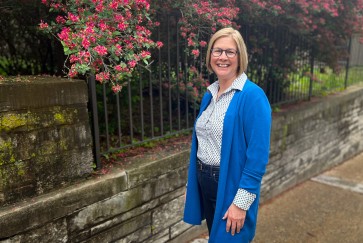“The Night Watchman,” Louise Erdrich’s Pulitzer Prize-winning novel about a fictional tribal leader who stands up to Congress when, in the 1950s, the U.S. government sought to disband tribes and take their land, is the One Book One Northwestern (OBON) selection for 2024-2025.
Erdrich will give a keynote address on Tuesday, Oct. 15, from 5 to 6 p.m. at Pick-Staiger Concert Hall on the Evanston campus.
The event is free and open to members of the Northwestern community and the public, but registration is required. Erdrich’s talk will also be livestreamed at Thorne Auditorium for those on the Chicago campus.
One Book faculty co-chairs Bryan Brayboy and Megan Bang will join Erdich in conversation as part of the keynote event. Brayboy is the dean of the School of Education and Social Policy and Bang is a professor and director of the Center for Native American and Indigenous Research.
This year’s book tells the story of tribal chairman Thomas Wazhashk, a night watchman for a factory where women of the Turtle Mountain Band, his niece Patrice among them, make Bulova watches and Defense Department ordnances with drill bits made of gemstones.
Charged with guarding the gems from theft, Wazhashk spends his long shifts keeping up with his work as leader of the tribal council and comes to realize the hidden objective of a bill proposed by Congress. If passed, the “termination bill” would overturn long-standing Native American tribal rights.
“I am thrilled for the Northwestern community to be engaged with this book. It reflects many important rich dimensions of history, community, family and more broadly human experience on the 100-year anniversary of the Indian Citizenship Act,” Bang said. “I hope the book and the programming help ignite our imaginations about what the next 100 years could and should be as we delve into all of the complexities Erdrich has masterly woven in her novel.”
While fictional, Wazhashk’s character is based on the extraordinary life of the author’s grandfather, Patrick Gourneau, who was chairman of Turtle Mountain Band of Chippewa from 1954-1958 and who himself was a night watchman of a plant that produced jewel artifacts and fought against the termination bill.
“In this season of literary wildfires, when cultural borrowings have unleashed protests that have shaken the publishing industry, the issue of authenticity is paramount,” wrote author Luis Alberto Urrea in his New York Times book review. “Erdrich retakes the lead by offering the reader the gifts of love and richness that only a deeply connected writer can provide. You never doubt these are her people.”
Interwoven into the narrative of “The Night Watchman” (HarperCollins, 2020) are memorable stories of other tribal members, all navigating the complexities of ambition, love, tradition and personal identity in an impoverished reservation community.
“Louise Erdrich is not only an incredible writer, but she is also a remarkable storyteller,” Brayboy said. “All her books, and especially ‘The Night Watchman,’ help readers understand the human condition, the suffering and true stories of resistance attached to policies like termination. I love this book.”
The author of other best-selling novels such as “Love Medicine,” “The Beet Queen,” “Tracks” and “The Bingo Palace,” Erdrich has also won the National Book Award, the National Book Critics Circle Award (twice) and the Library of Congress Prize in American Fiction.
In the book’s afterword, Erdrich writes that the memory of termination “has faded, even among American Indian people,” which was part of the motivation for her to write it. Her father is German and her mother, like her grandfather, was Turtle Mountain Chippewa.
She told NPR in 2020, “I grew up knowing who I was and accepting all parts of myself. And this is a part that I realized would not have existed had my grandfather not fought for it.”
All incoming first-year and transfer students receive a physical or electronic copy of the book. Students are encouraged to read the book to promote thought-provoking and authentic conversations across campus. There will also be a variety of University-wide programming surrounding the book.
“This is a wonderful book for the Northwestern community,” said Nancy Cunniff, OBON director, noting that OBON last selected a book centered on Indigenous people in 2015.
One Book One Northwestern is sponsored by the Office of the Provost and will include related films, lectures, field trips and other programming throughout the year. Contact onebook@northwestern.edu for more information.


